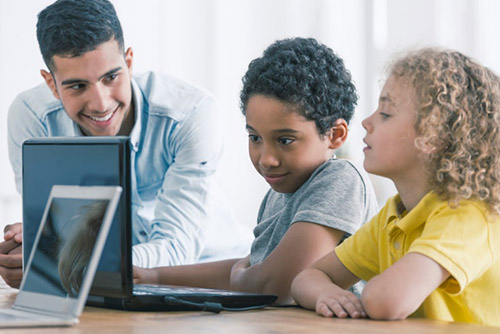

The internet can be a dangerous place for kids. What can start off as an innocent YouTube video viewing session can rapidly devolve. With so many links, suggested videos, and active users there to lure kids away from safe viewing material and into the darker, scarier portions of the web, parents have every right to be concerned.
In this post, we’ll highlight some of the most important ways you can keep your kids safe online. There’s no magic bullet or simple solution, but by practicing web safety actively with your kids, you reduce the chances that they’ll fall into a dangerous part of the internet.
One of the easiest ways to block out damaging content is by using web filtering software. These are programs that can be installed on your browser, which will stop kids from going onto sites with explicit images.� Common types of sites these filters will scrub from your kids’ internet browser include:
It’s not a perfect solution, and occasionally disturbing content can get past filters, but they’re mostly effective and will provide the kinds of guard rails your kids need to stay safe. If you work at a school with many kids to attend to, this is also one of the easiest ways to widely inoculate kids against dangerous online content. If you’re not doing it already, be sure that you install a web filter soon.
Keeping your kids educated on online safety is key. As nice as it would be to teach your kids that there is no bad in the world, and that the internet is a safe place to browse, that’s simply not true. And, it’s important that you’re straight forward, supportive, and honest with your kids.
Start by sitting down with your kids and explaining that there are some parts of the internet that have content that could be harmful to them. There are also people on the internet who may wish to do them harm, and it’s important to stay away from such people. What are some important lessons you can start with when teaching your kids? Try these to start:
It’s hard to have conversations about these sensitive issues with your kids, but it’s worth it in the long run, and lets them know you’re there to support them. If you need help, there are online therapy tools that can guide you through these parenting difficulties.
Depending on the age of your kids, it may be appropriate to occasionally check the browser history. You can use an open source browser that permits monitoring plugins, if you’re especially concerned. It’s normal for adolescents and teens to do a bit of exploring, and that certainly shouldn’t be punished, but it’s probably wise to check in on your elementary school kids’ browsing patterns to make sure they’re not looking at objectionable material.
If you do find something suspect, bring it up to them gently. Punishing them for it may do more harm than good – you don’t want them to end up in therapy as adults because of the way you reacted to their childhood missteps. Ask them why they were on that website, and talk with them about the merits of browsing the internet safely.
Remember that curiosity is all part of development, and if you’re open, honest, and compassionate with your children to begin with, they are more likely to trust your judgement when it comes to safely browsing the internet.
Keeping your kids safe online is a challenge of the 21st century, but as with many parenting challenges, being intentional and careful in your approach will go a long way to keeping your kids safe.










